英语虚拟语气语法总结
(完整版)英语虚拟语气语法归纳总结
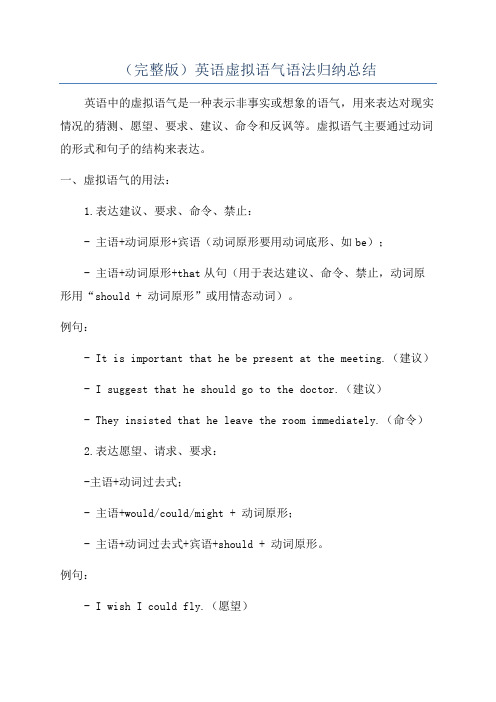
(完整版)英语虚拟语气语法归纳总结英语中的虚拟语气是一种表示非事实或想象的语气,用来表达对现实情况的猜测、愿望、要求、建议、命令和反讽等。
虚拟语气主要通过动词的形式和句子的结构来表达。
一、虚拟语气的用法:1.表达建议、要求、命令、禁止:- 主语+动词原形+宾语(动词原形要用动词底形、如be);- 主语+动词原形+that从句(用于表达建议、命令、禁止,动词原形用“should + 动词原形”或用情态动词)。
例句:- It is important that he be present at the meeting.(建议)- I suggest that he should go to the doctor.(建议)- They insisted that he leave the room immediately.(命令)2.表达愿望、请求、要求:-主语+动词过去式;- 主语+would/could/might + 动词原形;- 主语+动词过去式+宾语+should + 动词原形。
例句:- I wish I could fly.(愿望)- I would appreciate it if you could help me.(请求)3.表示虚拟条件:- If条件从句中的谓语动词用过去完成时,主句用would/should/might/could + have + 过去分词;- If条件从句中的谓语动词用过去时,主句用would/should/could + 动词原形。
例句:- If I had known his phone number, I would have called him.(虚拟条件)- If you had listened to me, we could have finished the project earlier.(虚拟条件)4.表达建议、要求、祝愿:- If only内部称述 + 主语 + 过去式。
虚拟语气用法总结(超好)
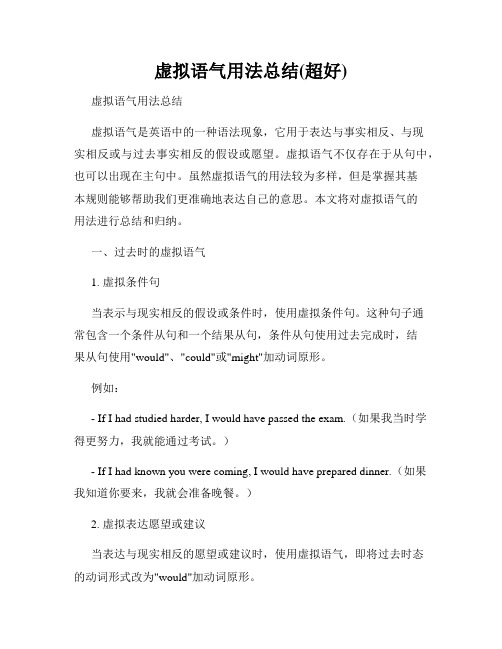
虚拟语气用法总结(超好)虚拟语气用法总结虚拟语气是英语中的一种语法现象,它用于表达与事实相反、与现实相反或与过去事实相反的假设或愿望。
虚拟语气不仅存在于从句中,也可以出现在主句中。
虽然虚拟语气的用法较为多样,但是掌握其基本规则能够帮助我们更准确地表达自己的意思。
本文将对虚拟语气的用法进行总结和归纳。
一、过去时的虚拟语气1. 虚拟条件句当表示与现实相反的假设或条件时,使用虚拟条件句。
这种句子通常包含一个条件从句和一个结果从句,条件从句使用过去完成时,结果从句使用"would"、"could"或"might"加动词原形。
例如:- If I had studied harder, I would have passed the exam.(如果我当时学得更努力,我就能通过考试。
)- If I had known you were coming, I would have prepared dinner.(如果我知道你要来,我就会准备晚餐。
)2. 虚拟表达愿望或建议当表达与现实相反的愿望或建议时,使用虚拟语气,即将过去时态的动词形式改为"would"加动词原形。
例如:- I wish I were taller.(我希望我更高。
)- She suggested that he take a bus.(她建议他坐公交车。
)二、现在时的虚拟语气1. 虚拟条件句与过去时的虚拟条件句类似,现在时的虚拟条件句也包含一个条件从句和一个结果从句。
条件从句使用"were to"结构或"should"加动词原形,结果从句使用"would"、"could"或"might"加动词原形。
例如:- If I were to win the lottery, I would travel the world.(如果我中了彩票,我会周游世界。
英语语法总结虚拟语气
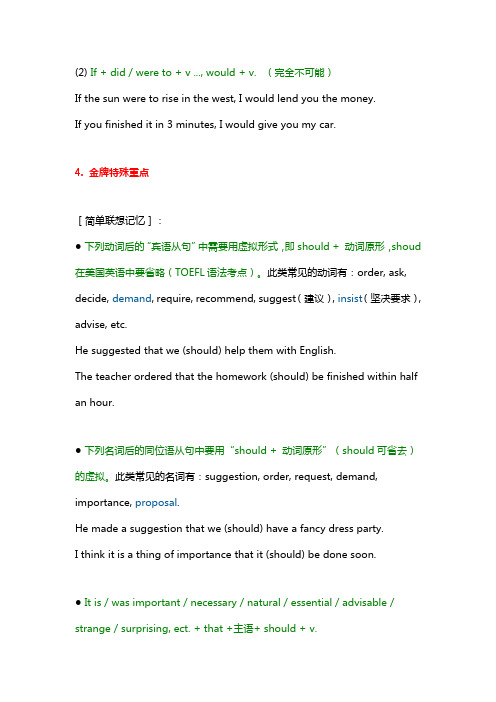
英语语法总结虚拟语气虚拟语气用来表达不可能或难以实现的愿望,与事实相反的假设,通常分为基本的三种形式。
1. 与现在事实相反的虚拟:If + did / were + ..., ... would/ should/ could/ might + do (动词原形)If I were you, I would go abroad at once. (I am not you.)If he knew it now, he could help me. (He doesn't know it now.)2. 与过去事实相反的虚拟:If + had done + ..., ... would (might) have done ...If I had known your telephone number yesterday, I would have phoned you. (I didn't know your telephone number.)If you had come here a little earlier just now, you might have met her. (You didn't come here earlier.)3. 与将来事实相反的虚拟:(1) If + should + v., ... would + v. (可能性很小)(译作“万一”)If it should rain tomorrow, you could stay at home.If I should fail, what should Ido?(2) If + did / were to + v ..., would + v. (完全不可能)If the sun were to rise in the west, I would lend you the money.If you finished it in 3 minutes, I would give you my car.4. 金牌特殊重点[简单联想记忆]:●下列动词后的“宾语从句”中需要用虚拟形式,即should + 动词原形,shoud 在美国英语中要省略(TOEFL语法考点)。
英语语法虚拟语气整理
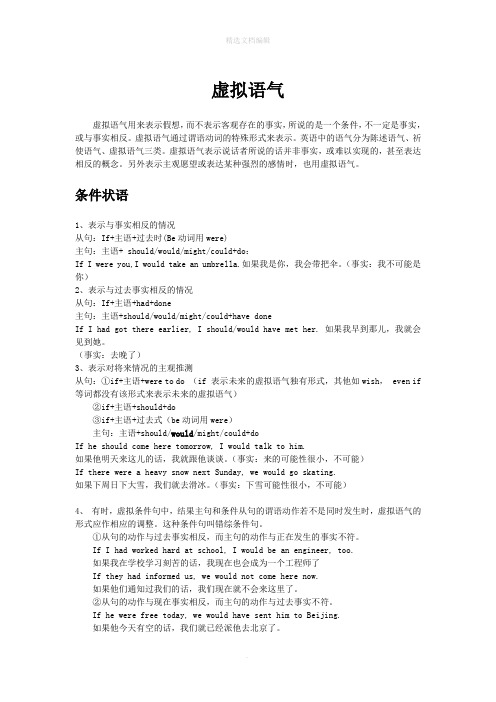
虚拟语气虚拟语气用来表示假想,而不表示客观存在的事实,所说的是一个条件,不一定是事实,或与事实相反。
虚拟语气通过谓语动词的特殊形式来表示。
英语中的语气分为陈述语气、祈使语气、虚拟语气三类。
虚拟语气表示说话者所说的话并非事实,或难以实现的,甚至表达相反的概念。
另外表示主观愿望或表达某种强烈的感情时,也用虚拟语气。
条件状语1、表示与事实相反的情况从句:If+主语+过去时(Be动词用were)主句:主语+ should/would/might/could+do:If I were you,I would take an umbrella.如果我是你,我会带把伞。
(事实:我不可能是你)2、表示与过去事实相反的情况从句:If+主语+had+done主句:主语+should/would/might/could+have doneIf I had got there earlier, I should/would have met her. 如果我早到那儿,我就会见到她。
(事实:去晚了)3、表示对将来情况的主观推测从句:①if+主语+were to do (if 表示未来的虚拟语气独有形式,其他如wish, even if 等词都没有该形式来表示未来的虚拟语气)②if+主语+should+do③if+主语+过去式(be动词用were)主句:主语+should/would/might/could+doIf he should come here tomorrow, I would talk to him.如果他明天来这儿的话,我就跟他谈谈。
(事实:来的可能性很小,不可能)If there were a heavy snow next Sunday, we would go skating.如果下周日下大雪,我们就去滑冰。
(事实:下雪可能性很小,不可能)4、有时,虚拟条件句中,结果主句和条件从句的谓语动作若不是同时发生时,虚拟语气的形式应作相应的调整。
英语虚拟语气语法总结

英语虚拟语⽓语法总结虚拟语⽓语法总结1. 虚拟条件句谓语动词的构成形式倒装结构1)Had you (=If you had) invited us, we would have come to your party. 2)Were I (=If I were) you, I would do more practice after class.3)Should it rain tomorrow, I wouldn’t go.2.虚拟条件句的特殊⽤法A. 混合虚拟条件句条件从句的动作和主句的动作不是同时发⽣.If he had followed the doctor’s advice, he would be quite all right now.(从句述说过去,主句述说现在。
)If I were you, I wouldn’thavemissed the film last night.(从句述说现在,主句述说过去。
)If I had had more self-confidence, I would become a teacher.(从句述说过去,主句述说现在。
)If the rescue team hadn’t found him, he would be dead.(从句述说过去,主句述说现在。
)If she didn’t love driving, she wouldn’t have become a driver.(从句述说现在,主句述说已发⽣。
)B. 含蓄虚拟条件句虚拟条件通过下述词语引出的短语:介词with, without, but for, if it had not been / if it were not for…etc例如:1)I couldn’t have won the competition without your encouragement.2)With your assistance (=If we had your assistance), we might finish the plan earlier3)Butfor you advice, I wouldnotbe able to do this work.4) Victor obviously doesn’t know what’s happened, otherwise he wouldn’thavemade such a stupid remark.C. 虚拟条件句中的表⽰结果的主句有时形式上可以省略,但意义上仍然存在。
虚拟语气语法总结
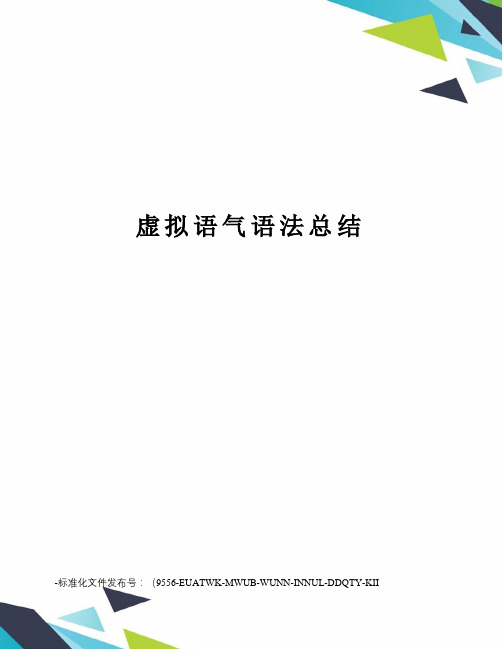
虚拟语气语法总结-标准化文件发布号:(9556-EUATWK-MWUB-WUNN-INNUL-DDQTY-KII虚拟语气在英语文法中有三种语气,即直述式语气(Indicative Mood)、祈使语气(Imperative Mood)和虚拟语气(Subjective Mood),其中前两种我们早已熟悉了,这里则不多谈了,如: How beautiful she is! 则是直述式语气,而Hurry up! Don't hurry up 则是祈使语气。
我们主要来看看虚拟语气的主要用法。
虚拟语气主要是用来表达一种无法实现的愿望,一种与事实相反的情况,或者将不可能实现的,或可能性很小的事实,假想为事实予以表述。
这样的动词结构称为虚拟语气。
它主要有三种形式,即与现在事实相反的假设,与过去事实相反的假设,与将来事实相反的假设。
它们具体结构如表8-7。
虚拟语气的构成虚拟语气其他习惯用法简表1 语法辨析Incorrect: If I was a girl, I would marry youCorrect: If I were a girl, I would marry you表示与现在事实相反的虚拟语气时,if条件句中的be动词一律用were,这句话应译为我要是个女孩,我就嫁给你。
实际上不可能是个女孩。
Incorrect: If I were you I will not worryCorrect: If I were you I shouldn't worry现在时的虚拟语气主句要用should 或would 加动词原形,这句话应译为我要是你的话,就没有必要烦恼。
要注意这种语态用在这里实际上是想把要讲出的观点表达得婉转些,有礼貌些。
Incorrect: God forgives you!Correct: God forgive you!这里的主语 God 是第三人称单数,之所以动词不加 s 是因为要表达一种祝愿,即人力所不能及的事情,实际上是 forgive前有一助动词should, May 等,但在口语中将其省略了。
英语《虚拟语气》语法知识总结归纳
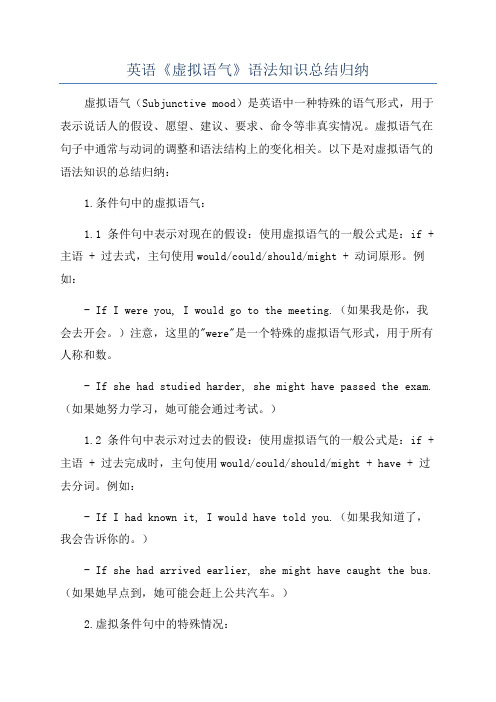
英语《虚拟语气》语法知识总结归纳虚拟语气(Subjunctive mood)是英语中一种特殊的语气形式,用于表示说话人的假设、愿望、建议、要求、命令等非真实情况。
虚拟语气在句子中通常与动词的调整和语法结构上的变化相关。
以下是对虚拟语气的语法知识的总结归纳:1.条件句中的虚拟语气:1.1 条件句中表示对现在的假设:使用虚拟语气的一般公式是:if + 主语 + 过去式,主句使用would/could/should/might + 动词原形。
例如:- If I were you, I would go to the meeting.(如果我是你,我会去开会。
)注意,这里的"were"是一个特殊的虚拟语气形式,用于所有人称和数。
- If she had studied harder, she might have passed the exam.(如果她努力学习,她可能会通过考试。
)1.2 条件句中表示对过去的假设:使用虚拟语气的一般公式是:if + 主语 + 过去完成时,主句使用would/could/should/might + have + 过去分词。
例如:- If I had known it, I would have told you.(如果我知道了,我会告诉你的。
)- If she had arrived earlier, she might have caught the bus.(如果她早点到,她可能会赶上公共汽车。
)2.虚拟条件句中的特殊情况:2.1 在虚拟条件句中表示命令、建议时,主句中的动词可以使用动词原形(而不是would/could/should/might + 动词原形)。
例如:- If you have any questions, please let me know.(如果你有任何问题,请告诉我。
)- If I were you, I would take a break.(如果我是你,我会休息一下。
英语虚拟语气语法归纳总结归纳归纳
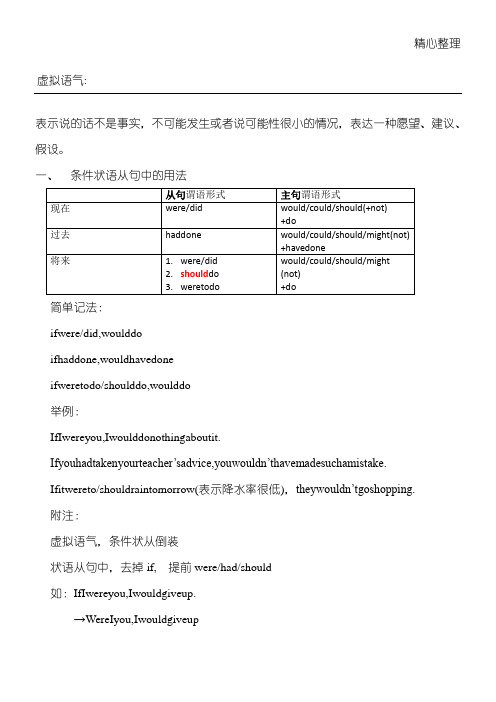
精心整理虚拟语气:表示说的话不是事实,不可能发生或者说可能性很小的情况,表达一种愿望、建议、假设。
一、条件状语从句中的用法附注:虚拟语气,条件状从倒装状语从句中,去掉if, 提前were/had/should如:IfIwereyou,Iwouldgiveup.→WereIyou,IwouldgiveupIfyouhadtakentheadvice,youwouldhave….→Hadyoutakentheadvice,youwouldhave…Iftheworldshouldcometoanend,……→Shouldtheworldcometoanend……另外,without,butfor,otherwise构成的条件状语从句中,也有含蓄的虚拟语气Butforthepopularizationofelectricity,wewouldleadawholedifferentlifetoday.(popularization普及,publicity宣传Withoutyourhelp,Iwouldhavefailed.但其实,高中英语考试也常考:错综虚拟语气条件句据各自的时间而定。
举例:(layout规划、设计、安排、陈设、摆放…layoutn.布局、规划)二、特殊句式:1.wish+宾语从句Iwishmyparentswouldn’tpunishme.IwishIhad n’t madesuchanirrevocablemistake.(irrevocable不可撤销、不可以挽回的)2.「十个词」一坚持:insist(表示坚持主张、认为,不表示坚持说)二命令:order,command三建议:advise,propose,suggest(表示建议,不表示表明、显示、暗示)四要求:这些动词后面的宾语从句要使用例:WesuggestedthatTom(should)have(beforelong,不久之后尝试翻译:他坚决要求例It’sanorderthatthesoldiersobeytheru lesinthearmy.Mysuggestionisthat everyone ofusthree finish onepartofthisprojectandthenwein tegratethemtogether.(integrate整合)3.wouldrather宁愿从句当中谓语形式Iwouldratheryoupaidmenow. Iwouldratheryouhadbeentothemovieinsteadofme.Don’tcometoday,I wouldratheryoucametomorrow.4.部分Asif/though句子好像、似乎Tomtoldmethisfairytaleinamannerasifithadhappenedforrealyesterday.5.Ifonly…….要是…就好了It’sessentialthatwemasteraforeignlanguagewhendoinginternationaltradea ndbusiness.(essential必要的、本质的、基本的…..)8.情态动词+havedonewouldhavedone本来要做couldhavedone本能够做(却没做)mighthavedone本来可能should/oughttohavedone本来应该做shouldn’t/oughtn’ttohavedone本来不应该做needn’thavedone本来不必要做你本来不应该告诉她真相。
- 1、下载文档前请自行甄别文档内容的完整性,平台不提供额外的编辑、内容补充、找答案等附加服务。
- 2、"仅部分预览"的文档,不可在线预览部分如存在完整性等问题,可反馈申请退款(可完整预览的文档不适用该条件!)。
- 3、如文档侵犯您的权益,请联系客服反馈,我们会尽快为您处理(人工客服工作时间:9:00-18:30)。
英语虚拟语气语法总结虚拟语气(Subjunctive Mood)这一语法项目是各类英语考试中心测试的重点之一。
虚拟语气是一种特殊的动词形式,用来表示说话人所说的话并不是事实,而是一种假设、愿望、怀疑或推测。
Ⅰ用以表示虚拟条件的虚拟语气⒈用if条件从句表示的虚拟条件,是虚拟条件最普通的方式。
①虚拟现在时表示与现在事实相反的假设,其if 从句的谓语形式用动词的过去式(be 一般用were),主句用would/ should/ could/ might +动词原形,例如:If I were in your position I would marry her.②虚拟过去时是表示与过去事实相反的假设,if 从句的谓语形式用过去完成时即had+过去分词,主句用would / should / could / might + have +过去分词,例如:If it had not rained so hard yesterday we could have played tennis.③大多数的虚拟条件句属于上面三种情况的一种,但并不排除存在条件和后果中,一个和现在情况相反,另一个和过去情况相反,例如:If you had followed what the doctor said, you would not have been so painful now.这个句子在高中出现频率颇高。
④但是,如果后果用了虚拟语气,而条件却用陈述语气,这种用法是错的。
⒉除了表示虚假条件外,if从句还可以表示对将来的推测,由于是将来还没有发生的,所以谈不上是真实的还是虚假的,只能说这个事情发生的可能性有多大。
一般情况下,可以用陈述语气的if从句来表示对一个未来事实的推测,这个事实是完全可能发生的。
If从句的谓语形式用一般过去式或用were to / should +动词原形,主句用would / should /could/ might +动词原形,例如:Jean doesn't want to work right away because she thinks that if she were to get a job she probably wouldn't be able to see her friends very often.(1996年1月四级第44题)⒊有时可以把含有助动词、情态动词、be或have的虚拟条件句中的连词if 省去,而将had , should, were 等词提到主语之前,即用倒装结构,这时候,如果出现not等否定词,否定词需放在主语后面。
这种结构在口语中很少使用,但频频出现在各类考试中出现,例如:If it had not rained so hard yesterday we could have played tennis.→Had it not rained so hard yesterday, we could have played tennis.⒋大多数的虚拟条件通过上面所讲的两种方法表达,但在个别句子中也可以通过介词without和介词短语but for表达,副词otherwise等表达出来。
例如:We didn't know his telephone number; otherwise we would have telephoned him.(1995年6月四级第46题)值得注意的是,包含but for的句子,谓语动词必定要用虚拟形式,但包含without等短语的句子,谓语动词未必一定要用虚拟语气。
⒌有时虚拟条件不是明确地表达出来,而在蕴含在用but引导的从句里,于是便出现了有谓语动词是虚拟语气的主句加上谓语动词是陈述语气的but从句构成的并列复合句,例如I would have hung you but the telephone was out of order.在这样的句子里,如果主句没有用虚拟语气,或者从句用了虚拟语气,都是错的。
Ⅱ用在宾语从句中的虚拟语气⒈在表示愿望的动词wish后的宾语从句中,需用虚拟语气。
(wish后的that 常省略),根据主句时态,从句谓语时态相应退后一位,例如:How she wished his family could go with him.⒉在具有愿望、请求、建议、命令等主观意愿的动词(desire, demand, advice, insist, require, suggest, propose, order, recommend, decide …) 后的宾语从句中需用虚拟语气。
谓语动词用(should) +动词原形。
值得注意的是,如果宾语从句的动词是否定的,否定词not的位置应在动词之前,而不是动词之后。
例如:The head nurse insisted that the patient not be move.另外,如suggest表达“暗示”,insist表示“坚持某种说法”时,后面的从句不用虚拟语气,例如:Her pale face suggests that she is ill.或He insisted that he did not kill the boy.除此之外,上述动词也要求用虚拟式①在It is+上述动词的过去分词,其后所跟的主语从句中,如It is suggested that pupils wear school uniforms.②在上述动词相应的名词形式作主语+连系动词,其后的表语从句中,例如His suggestion was that classed be re-scheduled.③在对上述动词相应的名词进行解释的同位语从句中,如:The workers raised the demand that their pay be increased to cope with the inflation.⒊would (had)rather , would sooner也用来表达主观愿望,它们之后的宾语从句中需用虚拟语气。
谓语动词用过去式表示现在或将来,用过去完成式表示与过去事实相反,例如:I would rather he went right now.Ⅲ其他形式的虚拟语气⒈it is +necessary等形容词后,that主语从句中虚拟形式使用,这类形容词包括necessary, important, essential, imperative, urgent, preferable, vital, advisable等,例如It is necessary that you listen to the teacher carefully.或者It is essential that you be able to pronounce every single word correctly.⒉在It's (high/about) time 之后的定语从句中需用虚拟语气。
谓语动词用过去式,例如It is high time that you went to school⒊虚拟语气在as if / as though 引导的方式状语从句中的应用(谓语动词形式与wish后的宾语从句基本相同)表示与现在事实相反或对现在情况有怀疑,谓语动词用过去式。
例如:He felt as if he alone were responsible for what had happened. 表示过去想象中的动作或情况,谓语动词用过去完成式。
⒋在lest 引导的状语从句中,谓语动词多用虚拟语气,(should )+ 动词原形。
例如:The mad man was put in the soft-padded cell lest he injure himself.(1998年1月四级第38题)⒌ 在if only 引起的感叹句中需用虚拟语气。
谓语动词用过去式或过去完成式。
例如:Look at the terrible situation I am in! if only I had followed your advice.虚拟语气是一种动词形式,表示说话人的一种愿望,假设,怀疑,猜测,建议等含义,虚拟语气所表示的含义不是客观存在的事实。
If I were you, I'd take them away.如果我是你的话,我就会带走他们。
If I had met Li Hua, I could had told him.如果我碰见了李华,我就告诉了他了。
If I had time. I could come to help you.如果我有时间,我会来帮助你的。
He suggested that our class should be divided into five groups.他建议说我们的班应该分成五个小组。
He speaks to us as if he had been there.他给我们讲的好象他去过那儿。
虚拟语气的用法1) 虚拟语气用在简单句中,表示祝愿,命令。
May you be happy.祝你幸福。
May you have a good time.祝愿你玩的痛快。
May the friendship between us last long.祝愿我们的友情天长地久。
Have a good journey!祝愿你旅途愉快!You go out!你出去!2) 虚拟语气用在宾语从句中。
动词wish, suggest,order,insist, propose,等词后面的宾语从句表示的是一种虚拟语气,宾语从句中的动词动作表示的只是一种愿望,要求。
I wish she would be on my side.我希望她能站在我一边。
I wish I could help him.我希望我能帮助他。
He insisted that all of us should be there on time by any means.他坚持要我们大家想尽办法按时去那儿。
动词demand, suggest, order, insist, propose 后面的从句中,"should" 可以省略。
The teacher suggested that we (should) clean the blackboard after class.老师建议我们课后把黑板擦了。
He ordered that the students wash the clothes every week by themselves.他要求学生每周都要自己洗衣服。
